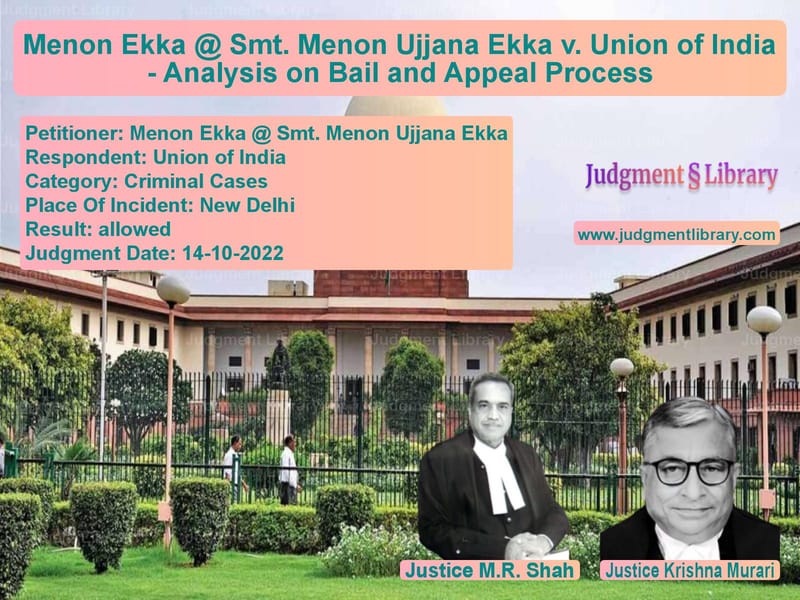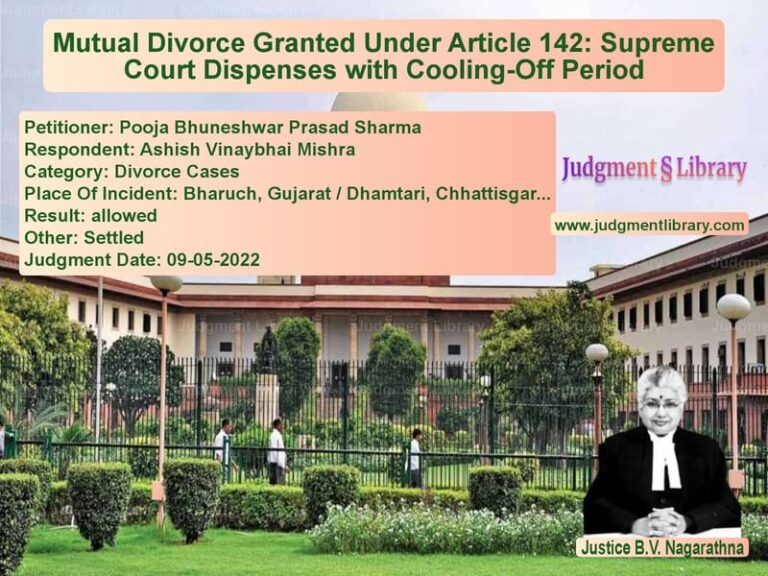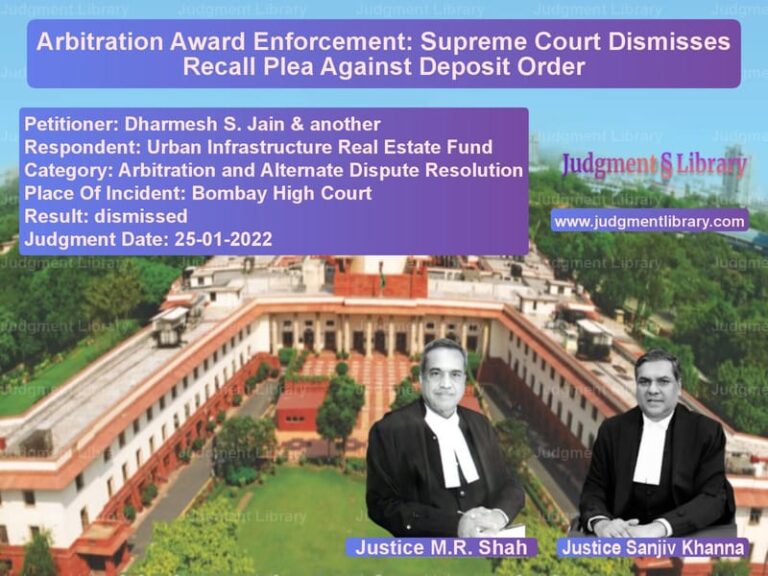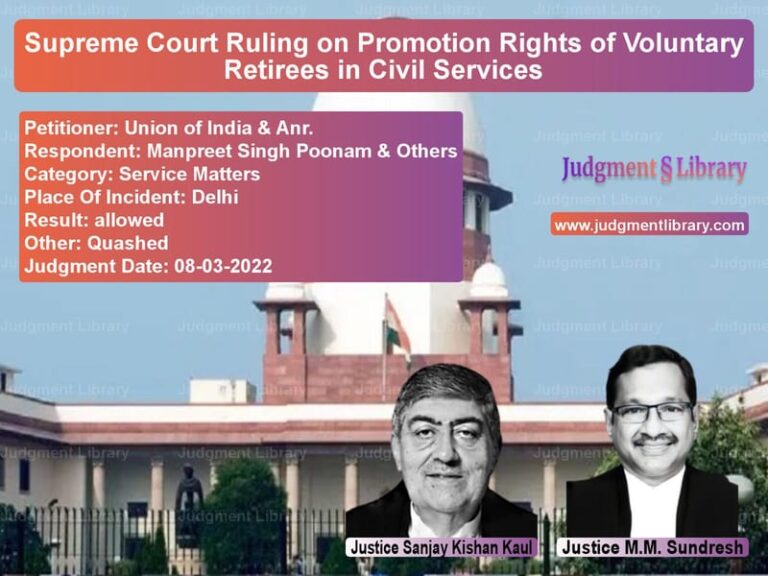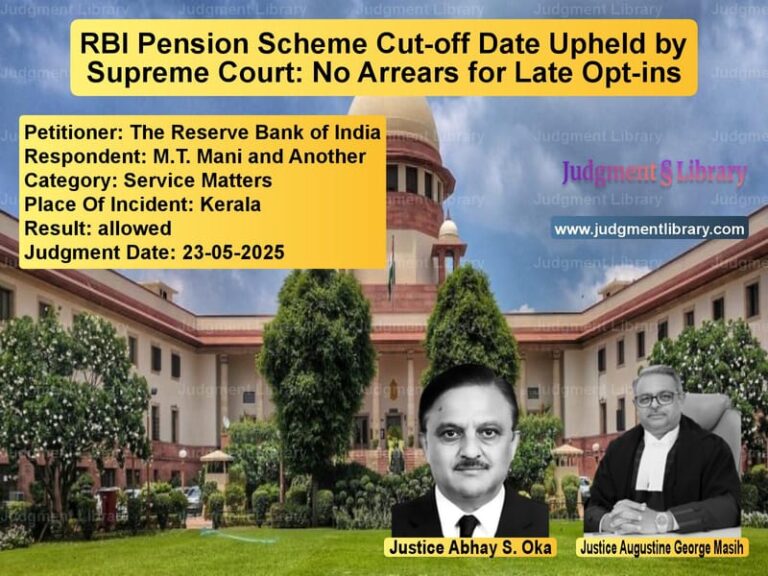Menon Ekka @ Smt. Menon Ujjana Ekka v. Union of India – Analysis on Bail and Appeal Process
The present case involves Menon Ekka, also known as Smt. Menon Ujjana Ekka, the appellant, who is seeking bail during the pendency of her appeal before the High Court. The appellant had been convicted for offenses under Section 109 IPC and Section 13(1)(e) and Section 13(2) of the Prevention of Corruption Act for being found in possession of disproportionate assets. The appellant was sentenced to 7 years of rigorous imprisonment and has already served 2 years and 9 months of her sentence. The issue at hand is whether the appellant should be granted interim bail pending the disposal of her appeal.
The appellant has approached the Supreme Court after the High Court of Jharkhand at Ranchi, in its judgment dated 05.08.2015, refused to grant her bail during the pendency of her appeal. The High Court had rejected her request, and the appellant, aggrieved by this decision, has filed the present appeal seeking to be released on interim bail until the appeal is finally heard by the High Court.
The key legal question in this case revolves around the factors that determine the release of a convict on bail during the pendency of an appeal, particularly when there is already an available statutory remedy. The appellant, a female convict, argues that due to the lengthy duration of her imprisonment and the uncertain timeline for the appeal’s final hearing, she should be granted bail. On the other hand, the respondent, Union of India, contends that the nature of the offense and the evidence in the case make it inappropriate to grant bail.
Petitioner and Respondent Arguments
Petitioner’s Arguments:
- The appellant’s counsel, Shri Gaurav Agrawal, submitted that the appellant, a lady, had already served 2 years and 9 months of her sentence. She had been convicted alongside her husband for offenses related to disproportionate assets under the Prevention of Corruption Act. The appellant contended that the appeal against her conviction was not likely to be heard soon, and in such circumstances, interim bail should be granted to her until the appeal is finally disposed of by the High Court.
- The appellant’s counsel further emphasized that given the appellant’s gender and the time she had already served, granting interim bail during the appeal process was reasonable and aligned with principles of fairness and justice.
Respondent’s Arguments:
- The respondent, represented by Ms. Swati Ghildiyal, opposed the grant of interim bail. She argued that the High Court was ready to hear the appeal for final disposal, but the appellant and the other co-accused had not been ready for the hearing of the appeal. Therefore, the delay in the hearing of the appeal could not be blamed on the respondent.
- The respondent’s counsel also pointed out that the charges against the appellant were serious, involving corruption and possession of disproportionate assets. The respondent submitted that considering the nature of the offense and the evidence on record, the High Court had rightly refused to grant bail.
Key Issues and Supreme Court’s Ruling
The Supreme Court examined the following key issues:
1. Release on Bail During the Pendency of Appeal
The central issue in this case was whether the appellant should be granted bail during the pendency of the appeal. The Court acknowledged the appellant’s claim of already having served 2 years and 9 months of her sentence. Given that the appeal was not likely to be heard in the near future, the Court found it reasonable to grant the appellant interim bail, taking into consideration her status as a female convict and the duration of her sentence served so far.
The Court noted that while the charges against the appellant were serious, the appellant’s personal circumstances and the prolonged delay in hearing the appeal weighed in favor of granting her bail. The Court also mentioned that the appellant was to be released on the conditions that may be imposed by the learned Trial Court.
2. The Role of Seriousness of Charges in Granting Bail
While the respondent emphasized the serious nature of the charges, the Court highlighted that granting bail in such cases is a matter of judicial discretion. The Court noted that while the charges were indeed serious, they did not preclude the possibility of granting bail, especially given the appellant’s gender and the fact that she had already served a substantial portion of her sentence.
3. Expedited Hearing of the Appeal
The Supreme Court also took the opportunity to direct the High Court to expedite the hearing of the appeal. The Court observed that the appellant had waited for a prolonged period for the disposal of her appeal, and it was in the interest of justice to ensure that the appeal was heard without unnecessary delays. The Court directed the High Court to notify the appeals of the appellant and other co-accused within two weeks and to ensure the final disposal of the appeal within six months.
Conclusion
The Supreme Court allowed the appeal and granted the appellant interim bail during the pendency of the appeal before the High Court. The Court specifically noted that the appellant had already served a significant portion of her sentence and directed the Trial Court to impose appropriate conditions for her release on bail. Additionally, the Court emphasized the importance of expediting the hearing of the appeals by the High Court and directed that the appeals be heard and disposed of within six months.
This judgment reflects the Court’s recognition of the need for balance between the seriousness of the charges and the rights of the accused, especially in cases where there is a prolonged delay in the hearing of an appeal. It also underscores the Court’s commitment to ensuring timely justice and expediting the disposal of appeals in criminal cases.
Impact and Implications
The decision in this case has significant implications for the treatment of bail applications during the pendency of appeals, particularly in cases involving female convicts and prolonged delays in the hearing of appeals. The Court’s ruling reinforces the principle that bail can be granted under certain circumstances, even in cases involving serious charges, when the delay in the appeal process is unreasonable. Additionally, the Court’s direction to expedite the hearing of appeals serves as a reminder of the importance of timely justice in criminal matters.
Petitioner Name: Menon Ekka @ Smt. Menon Ujjana Ekka.Respondent Name: Union of India.Judgment By: Justice M.R. Shah, Justice Krishna Murari.Place Of Incident: New Delhi.Judgment Date: 14-10-2022.
Don’t miss out on the full details! Download the complete judgment in PDF format below and gain valuable insights instantly!
Download Judgment: menon-ekka-@-smt.-me-vs-union-of-india-supreme-court-of-india-judgment-dated-14-10-2022.pdf
Directly Download Judgment: Directly download this Judgment
See all petitions in Bail and Anticipatory Bail
See all petitions in Money Laundering Cases
See all petitions in Fraud and Forgery
See all petitions in Terrorist Activities
See all petitions in Judgment by Mukeshkumar Rasikbhai Shah
See all petitions in Judgment by Krishna Murari
See all petitions in allowed
See all petitions in supreme court of India judgments October 2022
See all petitions in 2022 judgments
See all posts in Criminal Cases Category
See all allowed petitions in Criminal Cases Category
See all Dismissed petitions in Criminal Cases Category
See all partially allowed petitions in Criminal Cases Category

